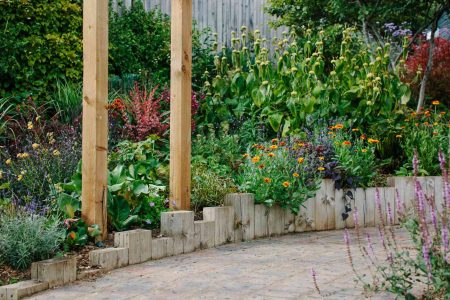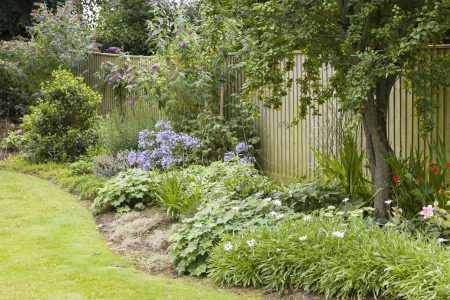If you’ve ever laid mulch only to watch it wash away mere days later, then you know the deep frustration it causes.
There are a few reasons this can happen, but fortunately, there are a few solutions, too. To stop anyone else from experiencing this common gardening mishap again, we turned to the experts.
Here are their top tips for keeping your freshly laid mulch intact.
Assess Your Risk Factors
For anyone new to gardening or mulching, you might be wondering how mulch can get washed away in the first place. As Teri Valenzuela, the natural science manager at Sunday, says, heavy rains are the primary reason mulch washes away.
If you live in an area known for heavy summer rains, you will probably need to take precautions. This is especially true if you have any gardens located on slopes.
Want more gardening tips? Sign up for our free gardening newsletter for our best-growing tips, troubleshooting hacks, and more!
Prepare Your Garden
The best way to keep your mulch from washing away is by planning ahead. Valenzuela suggests installing physical barriers like edging, or using rocks, logs, or other natural materials.
“Another effective strategy is digging trenches around garden beds to capture any mulch that moves during heavy rains,” Valenzuela says.
Create Level Beds
Rain might be the biggest culprit, but garden beds on a slope or incline are another big reason mulch washes away. Luckily, according to Gene Caballero, co-founder of GreenPal and a veteran of the landscaping industry, this is fixable.
“To prevent this, you can create level beds that enhance stability and ensure your garden remains well-mulched and attractive,” he says.
Pick Edging to Your Aesthetic
If you like the idea of edging, Cate Singleton, director of design at Tilly, has good news. You don’t have to lay something purely functional—you can select an edging option that fits your home’s design and blends seamlessly.
“There are so many different types of edging that can fit your aesthetic—from corten steel, wood, chopped stone, metal, and beyond,” Singleton says. “Edging also helps delineate the grass from the garden bed as nice finishing touch.”
Delay Mulching
Depending on where you’re located, Valenzuela says it also might be a good idea to delay mulching until after the rainy season passes. This is a particularly useful tip if you live somewhere with heavy spring rains.
“Applying mulch in late spring minimizes washout risks and helps retain soil moisture just when you need it,” Valenzuela says.
Consider Dense Ground Cover
Another option is to plant dense, vegetative ground cover—especially if washout is a recurring problem.
“These plants stabilize the soil with their deep roots and blend seamlessly into your garden’s ecosystem, preventing soil and earth from washing away,” Valenzuela says.
Use Heavier Mulch
As another consideration, Darren Muzzy, director of sales and operations for Michigan Tree Experts, says it could come down to the type of mulch you’re using. He suggests using a heavier type of mulch.
“As a rule of thumb, heavier mulch types like wood chips or bark are far less likely to wash away in comparison to their lightweight counterparts,” he says.
Don’t Overmulch
Once you are ready to lay your mulch, Singleton says how you lay it might also affect how well it stays in place. A good two to three-inch layer is the perfect amount to suppress weeds and help retain moisture.
Consider Mulch Mats or Binders
If every other method has failed, it might be time to invest in a solution that’s specifically designed to tackle this problem: mulch mats or mulch binders.
“Mulch mats are pre-made sections of mulch, held together by biodegradable netting,” says Muzzy. “They withstand natural deterioration and washout events well.”
Alternatively, mulch binders are sprays that are used on the mulch itself. These create a semi-permeable barrier that is resistant to weather-related damage.
Consider Mixing Your Mulch
As another safe alternative, Muzzy says you can mix your mulch with natural options like compost, straw, and pine needles, among others. These items not only contribute to the stability of the mulch but also enrich the soil as it decomposes, he says.
As a word of caution, Muzzy says it’s key to understand which mix is most compatible with your plants—you have to benefit both the mulch and the soil beneath it.
Read the full article here














